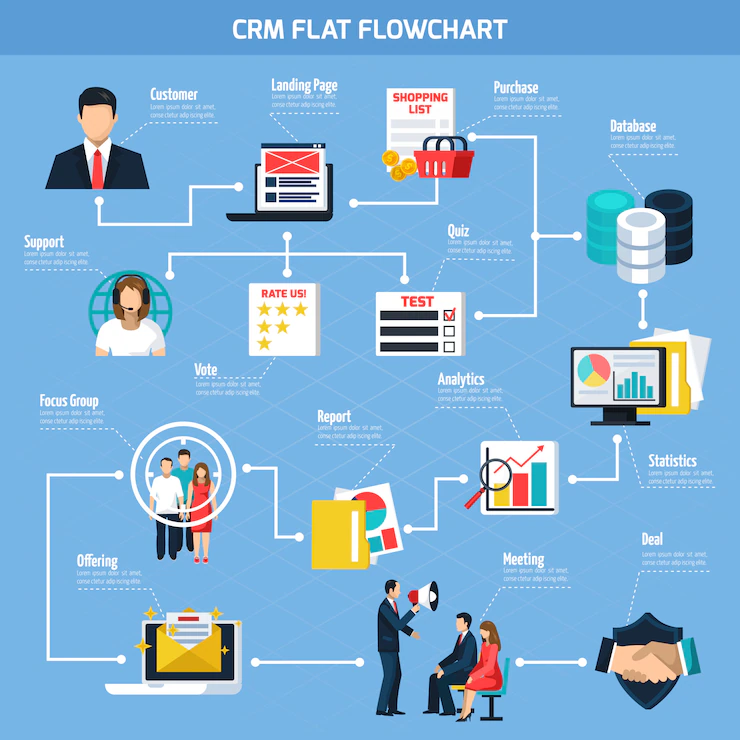As a business owner, your primary objective is to drive growth and ensure the long-term success of your company. However, with the competitiveness of today’s marketplace, this goal might seem far fetched. But, by leveraging the power of Customer Relationship Management tools, you can gain a significant advantage and pave the way for accelerated business growth. The role of CRM in business cannot be overstated. It encompasses various technologies and strategies that enable companies to streamline their interactions with customers. CRM serves as a catalyst for success, providing businesses with invaluable insights into their customers’ preferences, behaviors, and needs. Armed with this knowledge, businesses can effectively tailor the approach of their business and build a strong customer relationship that drives business growth.

Here are some of the importance of CRM for small and large scaled businesses:
Enhanced customer satisfaction : Customer relationship management (CRM) tools give businesses a very comprehensive view of customer information. This allows them to tailor their interactions based on each client’s information. When businesses are able to provide clients with what they need or want exactly, customer satisfaction is enhanced.
Increased customer retention. Another reason why marketers invest in CRM is increased customer retention. If customer satisfaction can be enhanced, the possibility of retaining them is very high. This ultimately helps businesses make more sales and stay in business.

Streamlined sales process. Customer relationship management (CRM) tools offer technological benefits by streamlining the sales process and reducing manual work. Through automation, leads can be captured and imported seamlessly. The automated workflow also enables personalized lead nurturing and follow-ups leading to less time and effort. By minimizing manual efforts, CRM will improve productivity, sales efficiency, and overall business performance. Effective market campaigns Another thing that comes from employing CRM software and tools in businesses is the production of market campaigns that generate good leads. The data and insights collected by the tools will be used to make targeted promotions, offers, and messages for each client. This will enhance companies' conversion rates and ROI.

Efficient team collaboration. With CRM, team members from different departments can collaborate seamlessly and have access to the same up-to-date client data. This promotes better coordination and alignment among team members, preventing duplication of efforts and enabling a more holistic view of customer interactions. CRM also allows teams to assign tasks, set reminders, and track progress. This ensures that no information falls through the cracks and then business growth and success are maintained.
Scalability and growth. The whole data and insights collected by CRM tools can enable businesses to scale and adapt to growing customer bases, expanding sales operations, and changing business requirements. With the system, companies will not be overwhelmed by increased demands. Instead, they can leverage the data and insights provided by CRM to effectively allocate resources, optimize processes, and make informed decisions.
How To Implement Customer Relationship Management (CRM) In Businesses.
1. Choose the right CRM system: This involves carefully evaluating various CRM solutions based on the specific needs and requirements of your business. Businesses looking to use CRM as a business strategy must consider the size of their organization, industry, and specific functionalities. This will help you to pick the best CRM that aligns with your desires and goals.

2. Train your employees: Comprehensive training and education on how to use CRM must be given to your staff members. This should cover various aspects, including understanding the CRM functionalities, data entry and management, customer interaction protocols, and analyzing customer data for better decision-making. By ensuring that your employees are well-trained, the benefits of CRM will be attained.
3. Integrate CRM with other systems: This process includes - Identifying the systems requiring integration, such as email marketing or customer support software. Choose the appropriate integration method, such as APIs or plugins. Map out the data flow to ensure accurate and real-time synchronization of customer information. Test and validate the integration for seamless functionality.

4. Use CRM data to improve your business: The data and insights collected by CRM tools should be used judiciously in your business. Identify your sales trends and forecast future demands, and use them to make data-driven decisions. This tool is designed to help your business reach maximum growth in the long run.
CONCLUSION
In today's competitive business landscape, implementing Customer Relationship Management (CRM) is crucial for driving growth and ensuring long-term success. With its multitude of benefits, CRM empowers businesses to build strong customer relationships and unlock their full potential. Embracing CRM is not just a choice, but a strategic imperative for every business seeking accelerated growth and sustainable success. To harness the full potential of CRM, businesses should invest in robust CRM systems, train their employees on its effective usage, and align CRM strategies with overall business objectives. By putting customers at the center of their operations and leveraging CRM tools, businesses can drive growth, enhance customer loyalty, and stay ahead of the competition.



